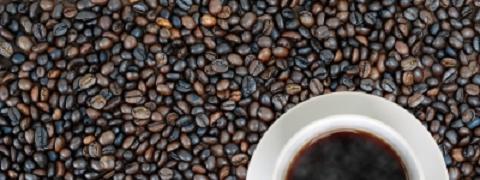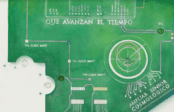[dropcap style=”font-size:100px; color:#992211;”]A[/dropcap] holistic approach to science news today.
Three separate stories linked by a mental image. That image? A morning routine whereby our earnest subject wakes, washes his mouth out with a sugar solution, spits the sweet mouthful into a home fuel-ethanol unit, then hastily gulps down a large espresso to rid his mouth of the taste.
It’s the Jetsons all over again, a utopia of high-tech sustainable closed energy cycles, second only to the worldwide scrabble for domestic nuclear fusion and interstellar spaceflight.
Sugar mouthwash makes you more motivated, caffeine improves your cognitive function, and fermented-sugar ethanol will convert the schoolrun into an environmentally friendly activity, wafting the adjacent cycle lanes with the Wonka waft of candyfloss and lemon drops.
Better mental function when we get to work, sustainable ways to get us there. Makes you feel much better about making the 1% just that little bit richer, doesn’t it?
Sugar Mouthwash Improves Self-Control
According to a study co-authored by University of Georgia professor of psychology Leonard Martin published Oct. 22 in Psychological Science, a mouth rinse with glucose improves self-control.
His study looked at 51 students who performed two tasks to test self-control. The first task, which has shown to deplete self-control, was the meticulous crossing out of Es on a page from a statistics book. Then, participants performed what is known as the Stroop task where they were asked to identify the color of various words flashed on a screen, which spell out the names of other colors. The Stroop task’s goal is to turn off the student’s tendency to read the words and instead see the colors.
Half of the students rinsed their mouths with lemonade sweetened with sugar while performing the Stroop test, the other half with Splenda-sweetened lemonade. Students who rinsed with sugar, rather than artificial sweetener, were significantly faster at responding to the color rather than the word.
Source: University of Georgia
Sugar Fuel Gets a New Boost
The late Chaim Weizmann’s process to produce diesel fuel from the products of a bacterial fermentation discovered nearly 100 years ago employs the bacterium Clostridium acetobutylicum to ferment sugars into acetone, butanol and ethanol.
More recently, Harvey Blanch and Douglas Clark, UC Berkeley professors of chemical and biomolecular engineering have developed a way of extracting the acetone and butanol from the fermentation mixture while leaving most of the ethanol behind, while Dean Toste, UC Berkeley professor of chemistry developed a catalyst that converted this ideally-proportioned brew into a mix of long-chain hydrocarbons that resembles the combination of hydrocarbons in diesel fuel.
Tests showed that it burned about as well as normal petroleum-based diesel fuel.
“It looks very compatible with diesel, and can be blended like diesel to suit summer or winter driving conditions in different states,” said Blanch.
The current catalytic process uses palladium and potassium phosphate, but further research is turning up other catalysts that are as effective, but cheaper and longer-lasting, Toste said. The catalysts work by binding ethanol and butanol and converting them to aldehydes, which react with acetone to add more carbon atoms, producing longer hydrocarbons.
“To make this work, we had to have the biochemical engineers working hand in hand with the chemists, which means that to develop the process, we had learn each other’s language,” Clark said. “You don’t find that in very many places.”
Clark noted that diesel produced via this process could initially supply niche markets, such as the military, but that renewable fuel standards in states such as California will eventually make biologically produced diesel financially viable, especially for trucks, trains and other vehicles that need more power than battery alternatives can provide.
“Diesel could put Clostridium back in business, helping us to reduce global warming,” Clark said. “That is one of the main drivers behind this research.”
Source: UC Berkeley
Caffeine Improves Cognitive Function
Caffeine perks up most coffee-lovers, but a new study shows a small dose of caffeine also increases their speed and accuracy for recognizing words with positive connotation. The research published November 7 in the open access journal PLOS ONE by Lars Kuchinke and colleagues from Ruhr University, Germany, shows that caffeine enhances the neural processing of positive words, but not those with neutral or negative associations.
Previous research showed that caffeine increases activity in the central nervous system, and normal doses of caffeine improve performance on simple cognitive tasks and behavioral responses. It is also known that certain memories are enhanced when strong positive or negative emotions are associated with objects, but the link between caffeine consumption and these emotional biases was unknown.
This study demonstrates, for the first time, that consuming 200 mg of caffeine, equivalent to 2-3 cups of coffee, 30 minutes before a task can improve the implicit recognition of positive words, but has no effect on the processing of emotionally neutral or negative words. The authors suggest that this effect is driven by caffeine’s strong dopaminergic effects in the language-dominant regions of the brain.
Citation: Kuchinke L, Lux V (2012) Caffeine Improves Left Hemisphere Processing of Positive Words. PLoS ONE 7(11): e48487. doi:10.1371/journal.pone.0048487
Sidebar Image: antpkr/FreeDigitalPhotos.net

The aim of art is to represent not the outward appearance of things, but their inward significance. – Aristotle






















